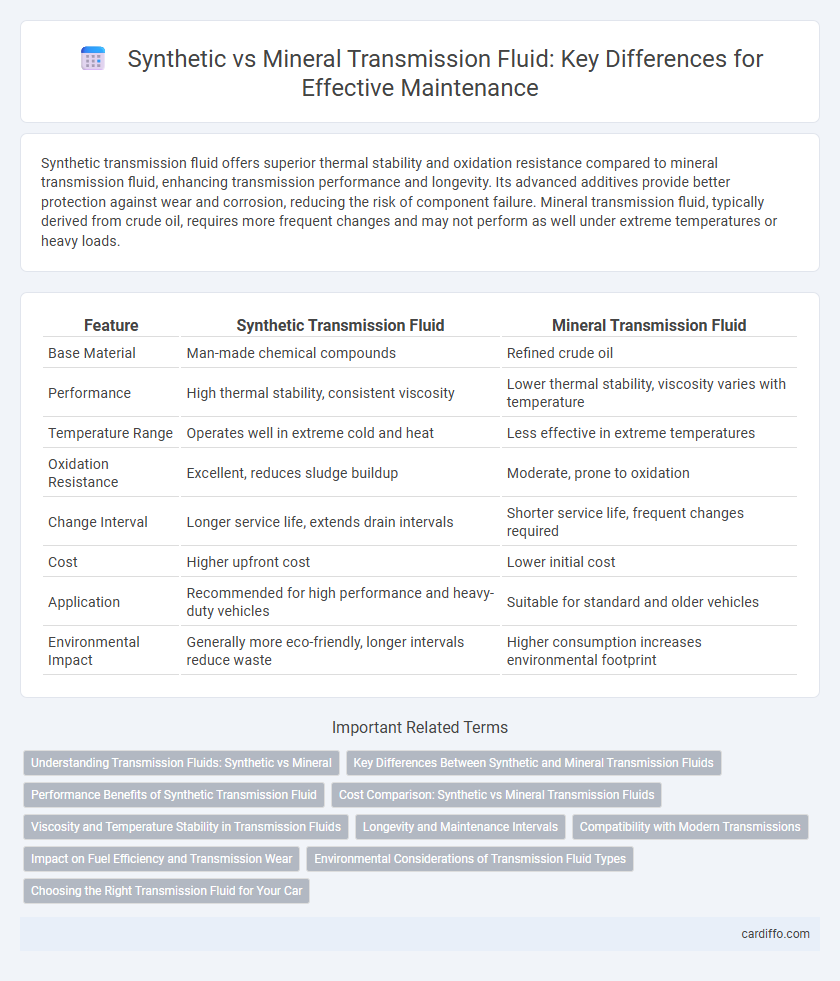Synthetic transmission fluid offers superior thermal stability and oxidation resistance compared to mineral transmission fluid, enhancing transmission performance and longevity. Its advanced additives provide better protection against wear and corrosion, reducing the risk of component failure. Mineral transmission fluid, typically derived from crude oil, requires more frequent changes and may not perform as well under extreme temperatures or heavy loads.
Table of Comparison
| Feature | Synthetic Transmission Fluid | Mineral Transmission Fluid |
|---|---|---|
| Base Material | Man-made chemical compounds | Refined crude oil |
| Performance | High thermal stability, consistent viscosity | Lower thermal stability, viscosity varies with temperature |
| Temperature Range | Operates well in extreme cold and heat | Less effective in extreme temperatures |
| Oxidation Resistance | Excellent, reduces sludge buildup | Moderate, prone to oxidation |
| Change Interval | Longer service life, extends drain intervals | Shorter service life, frequent changes required |
| Cost | Higher upfront cost | Lower initial cost |
| Application | Recommended for high performance and heavy-duty vehicles | Suitable for standard and older vehicles |
| Environmental Impact | Generally more eco-friendly, longer intervals reduce waste | Higher consumption increases environmental footprint |
Understanding Transmission Fluids: Synthetic vs Mineral
Synthetic transmission fluid offers superior thermal stability, oxidation resistance, and performance in extreme temperatures compared to mineral transmission fluid. Mineral transmission fluid, derived from refined crude oil, provides adequate lubrication but tends to break down faster under stress, requiring more frequent changes. Selecting synthetic fluid helps extend transmission life and maintain optimal shifting performance, especially in high-stress driving conditions.
Key Differences Between Synthetic and Mineral Transmission Fluids
Synthetic transmission fluid offers superior thermal stability and oxidation resistance compared to mineral transmission fluid, enhancing overall transmission performance and longevity. Mineral transmission fluid typically contains natural base oils with additives, resulting in lower viscosity stability under extreme temperature variations. Key differences also include synthetic fluid's ability to maintain optimal lubrication at high temperatures and reduced deposit formation, whereas mineral fluid may degrade faster and require more frequent changes.
Performance Benefits of Synthetic Transmission Fluid
Synthetic transmission fluid offers superior performance benefits compared to mineral transmission fluid due to its enhanced thermal stability and oxidation resistance. These properties allow synthetic fluids to maintain optimal viscosity under extreme temperatures, reducing wear and extending transmission life. Improved frictional characteristics in synthetic fluids also ensure smoother gear shifts and better fuel efficiency.
Cost Comparison: Synthetic vs Mineral Transmission Fluids
Synthetic transmission fluid typically costs two to three times more than mineral transmission fluid due to advanced refining processes and additives that enhance performance and longevity. Despite the higher initial expense, synthetic fluids offer extended drain intervals and better protection, potentially reducing long-term maintenance costs and transmission repairs. Mineral transmission fluids are more affordable upfront but may require more frequent changes, leading to higher overall expenses in vehicle upkeep.
Viscosity and Temperature Stability in Transmission Fluids
Synthetic transmission fluid offers superior viscosity stability across a wide temperature range compared to mineral transmission fluid, ensuring consistent lubrication under both extreme cold starts and high operating temperatures. Its advanced chemical formulation reduces viscosity breakdown, minimizing wear and improving transmission efficiency. Mineral fluids tend to thicken in cold conditions and thin out under heat, potentially compromising transmission performance and longevity.
Longevity and Maintenance Intervals
Synthetic transmission fluid typically offers superior longevity, often lasting up to 100,000 miles compared to 30,000 to 60,000 miles for mineral transmission fluid. Enhanced thermal stability and oxidation resistance in synthetic fluids reduce the frequency of fluid changes and maintenance intervals. This extended durability results in fewer service interventions and improved overall transmission performance.
Compatibility with Modern Transmissions
Synthetic transmission fluid offers superior compatibility with modern transmissions due to its advanced formulation, providing enhanced thermal stability and oxidation resistance. Mineral transmission fluids, derived from refined crude oil, tend to degrade faster under high temperatures and may lack compatibility with the tighter tolerances and lubrication requirements of contemporary automatic and CVT transmissions. Modern vehicles increasingly require synthetic fluids to ensure optimal performance, extended transmission life, and adherence to manufacturer specifications.
Impact on Fuel Efficiency and Transmission Wear
Synthetic transmission fluid offers superior lubrication, reducing friction and enhancing fuel efficiency compared to mineral transmission fluid. Its advanced additives provide better protection against transmission wear, resulting in longer component lifespan and fewer maintenance issues. Using synthetic fluid can lead to smoother gear shifts and improved overall transmission performance under extreme conditions.
Environmental Considerations of Transmission Fluid Types
Synthetic transmission fluid offers significant environmental benefits due to its longer lifespan and superior thermal stability, which reduces the frequency of fluid changes and limits waste generation. Mineral transmission fluid, derived from crude oil, typically requires more frequent replacements, contributing to higher fluid consumption and greater environmental impact through increased disposal and potential contamination risks. Choosing synthetic fluids supports sustainability efforts by minimizing resource extraction and lowering the ecological footprint associated with vehicle maintenance.
Choosing the Right Transmission Fluid for Your Car
Choosing the right transmission fluid for your car is essential to ensure optimal performance and longevity of the transmission system. Synthetic transmission fluid offers superior thermal stability, better oxidation resistance, and enhanced lubrication properties compared to mineral transmission fluid, making it ideal for high-performance and modern vehicles. Mineral transmission fluid, derived from refined crude oil, provides adequate protection for older or less demanding transmissions but may require more frequent changes due to its lower durability.
Synthetic Transmission Fluid vs Mineral Transmission Fluid Infographic

 cardiffo.com
cardiffo.com